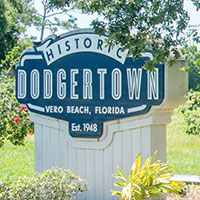 Even with World Series, not much buzz here about Dodgers
Even with World Series, not much buzz here about Dodgers
STORY
Last week, for the first time in 70 years, the Los Angeles Dodgers went to a World Series without any tangible ties to Vero Beach, and almost nobody here seemed to care.
Such a possibility was unthinkable in 1988, when the Dodgers won their sixth world championship and Vero Beach wasn't just the home of Dodgertown – then America's most revered and nostalgic spring-training site – but it was a Dodger town.
"We did everything here," said Craig Callan, the longtime Vero Beach resident who has spent most of his adult life managing the operations at Dodgertown and, more recently, Historic Dodgertown.
"We had spring training, extended spring training, the rookie league Dodgers, the Vero Beach Dodgers, the fall instructional league . . . We were the hub of the entire organization," he added. "We also had a strong and constant presence in the community.
"There was a real connection between the team and town."
Not only were the Dodgers' Sunday afternoon games broadcast on local radio – WTTB-AM also aired all of the Class A team's contests – but the cover of the local daily’s sports section usually included a headline from the previous day's game.
Occasionally, the newspaper would run Dodgers-related columns by the Los Angeles Times' Pulitzer Prize-winning writer, Jim Murray.
"Back then, we had a 1:40 a.m. deadline, and the reason was so we could get the Dodgers' regular-season games on the West Coast in the paper," said Chuck Balnius, a now-retired, former Press Journal sports editor.
"They were out front almost every day," he added. "And during the playoffs and World Series, they were usually the lead story every day, except on Saturday mornings."
Saturday morning's headlines in the fall belonged to the legendary Billy Livings and the Vero Beach High School football team. The Dodgers, though, were as much this community's home team as the Fighting Indians – even when playing 3,000 miles away.
Certainly, the arrival of the Florida State League's Vero Beach Dodgers in 1980 enhanced the relationship. Fans here could watch Dodgers prospects embark on their careers at Holman Stadium and, when the players returned for spring training the next year, follow the players' progress toward Los Angeles.
“A lot of people called them the 'Baby Dodgers,’” Callan said. “To this day, people tell me they miss the Vero Beach Dodgers more than spring training.”
Throughout the 1980s, Dodgers hats – as well as Vero Beach Dodgers caps – were as common a sight around town as Vero Beach football apparel.
Those hats became more visible in 1988, as the Orel Hershiser-led Dodgers knocked off the favored New York Mets in the National League Championship Series and then, propelled by Kirk Gibson's historic, walk-off home run in Game 1, stunned the favored Oakland Athletics in five games.
"That was a special year for me," Callan said. "I became the director of Dodgertown, got married, built a new home and got a World Series ring. I'll never forget it.
"And I'll always remember what it was like in Vero Beach as the Dodgers kept winning," he added. "This town was red-hot for the Dodgers. They were our Dodgers, and everybody felt a part of it.
"That was always important to Peter."
Former Dodgers owner and president Peter O'Malley embraced and encouraged a family-type feel to the organization – and he believed Dodgertown and Vero Beach were members of the Dodger family.
However, with corporate ownership of major league teams becoming the norm, O'Malley sold the Dodgers to Rupert Murdoch's Fox Entertainment Group in 1998.
A decade later, four years after Fox sold the team to Frank McCourt, the Dodgers ended their 61-year marriage to Vero Beach and moved their spring-training headquarters to Arizona.
This year, nearly a decade after the team's buses drove away from Dodgertown for the final time on St. Patrick's Day 2008, the Dodgers played their way to the World Series for the first time in 29 years.
But there's not much buzz here – nothing close to what it was in 1988, when the Dodgers were Vero Beach's home team.
This is no longer a Dodger town.
"A lot of those feelings began to disappear when Peter O'Malley sold the team and the Dodgers went from being a family business to part of a corporate conglomerate," said Bobby McCarthy, owner of Bobby's Restaurant & Lounge, which was a popular Dodgers' hangout during spring training.
"Then, when they moved their spring training to Arizona, that was it," he continued. "They've been gone almost 10 years now, and nobody cares anymore. We've got the World Series games on the TVs in the bar and people are watching it, but it's not a focal point. They're not coming in just to watch the games.
"There would be more interest if it were the Yankees or Red Sox," he added. "There was more interest last year because it was the Cubs. The Dodgers have been gone a long time now."
O'Malley, whose lifelong affection for Vero Beach prompted him to form a five-way partnership to resurrect Dodgertown as a multi-sport facility in 2012, is hoping to keep alive the Dodgers' spring-training legacy here.
His efforts have contributed to the local economy, which has benefitted from the out-of-town groups and sporting events he has attracted to what is now called Historic Dodgertown.
As for Vero Beach, however, the Dodgers are history – so much so that their former spring-training home did nothing to mark their return to the World Series.
"The Dodgers' following definitely has dropped off, and that will continue as the years go by," Callan said. "It's hard to feel the same connection when they're not here."








